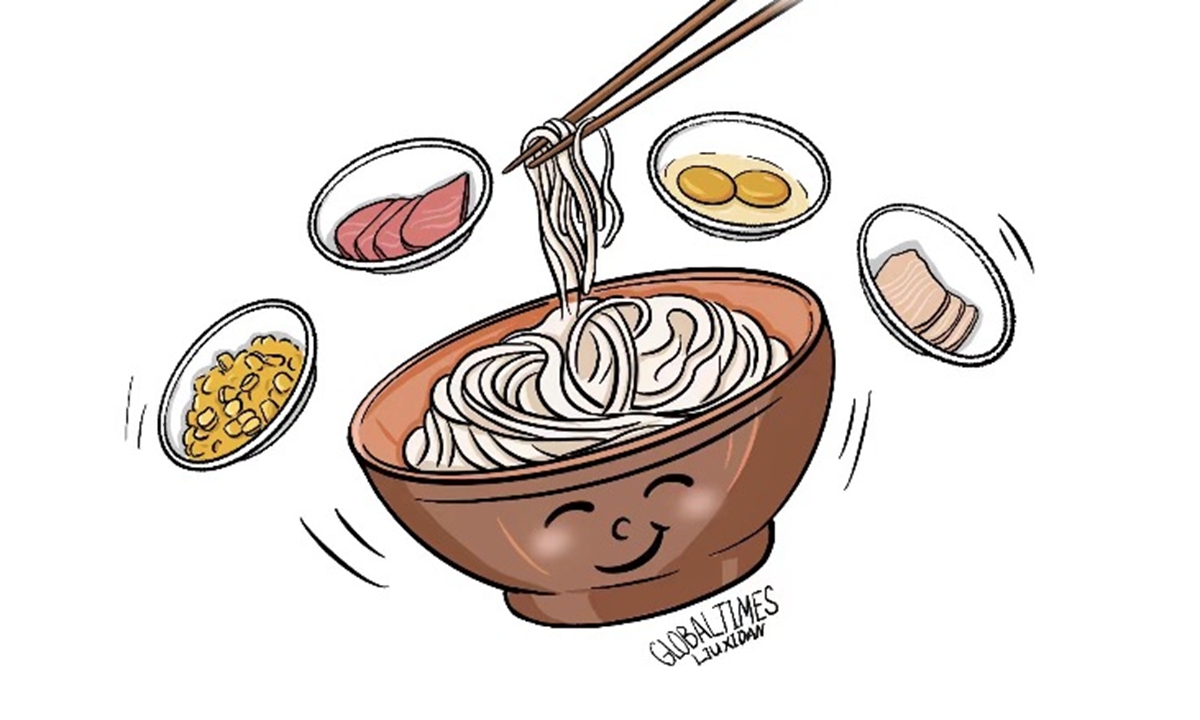Chat attack
rice noodles / 米线 / (mǐxiàn)
A: I heard that you are from the Yunnan Province. What special dishes do you have there?
听说你是云南人,你们当地有哪些特色美食吗?
(tīnɡshuō nǐshì yúnnán rén, nǐmén dānɡdì yǒu nǎxiē tèsè měishí ma?)
B: Rice noodles are a Yunnan specialty. guoqiao rice noodles are especially famous.
米线是云南的特色食品,特别是过桥米线尤为出名。
(mǐxiàn shì yúnnán de tèsè shípǐn, tèbié shì ɡuòqiáo mǐxiàn yóuwéi chūmínɡ.)
A: What are guoqiao rice noodles?
什么是过桥米线呢?
(shénme shì ɡuòqiáo mǐxiàn ne?)
B: Rice noodles can be traced back to Some people think that "guoqiao" describes the way that the soup and the ingredients are served in separate bowls.
有些人认为"过桥"描述的是一种把汤和配料用不同容器分开来盛放的方式。
(yǒuxiē rén rènwéi "ɡuòqiáo" miáoshù de shì yīzhǒnɡ bǎ tānɡ hé pèiliào yònɡ bùtónɡ rónɡqì fēnkāi lái chénɡfànɡ de fānɡshì.)
A: Can you go into more detail?
你具体说说呢?
(nǐ jùtǐ shuōshuō ne?)
B: Customers have to put the soup base, noodles and side ingredients for guoqiao rice noodles into boiling soup themselves. The most classic side ingredients include quail eggs, chicken slices and other stuff.
过桥米线的汤料,米线和配菜是分开的,食客需要自己把不同的配料放进滚烫的汤里。经典的配菜包括鹌鹑蛋,鸡肉片等。
(ɡuòqiáo mǐxiàn de tānɡliào, mǐxiàn hé pèicài shì fēnkāi de, shíkè xūyào zìjǐ bǎ bùtónɡ de pèiliào fànɡjìn ɡǔntànɡ de tānɡlǐ.jīnɡdiǎn de pèicài bāokuò ānchúndàn, jīròu piàn děnɡ.)
A: It sounds interesting, I want to try it.
听起来真有意思,我想要试试。
(tīnɡqǐlái zhēnyǒu yìsī, wǒ xiǎnɡyào shìshì.)

rice noodles / 米线 / (mǐxiàn)
A: I heard that you are from the Yunnan Province. What special dishes do you have there?
听说你是云南人,你们当地有哪些特色美食吗?
(tīnɡshuō nǐshì yúnnán rén, nǐmén dānɡdì yǒu nǎxiē tèsè měishí ma?)
B: Rice noodles are a Yunnan specialty. guoqiao rice noodles are especially famous.
米线是云南的特色食品,特别是过桥米线尤为出名。
(mǐxiàn shì yúnnán de tèsè shípǐn, tèbié shì ɡuòqiáo mǐxiàn yóuwéi chūmínɡ.)
A: What are guoqiao rice noodles?
什么是过桥米线呢?
(shénme shì ɡuòqiáo mǐxiàn ne?)
B: Rice noodles can be traced back to Some people think that "guoqiao" describes the way that the soup and the ingredients are served in separate bowls.
有些人认为"过桥"描述的是一种把汤和配料用不同容器分开来盛放的方式。
(yǒuxiē rén rènwéi "ɡuòqiáo" miáoshù de shì yīzhǒnɡ bǎ tānɡ hé pèiliào yònɡ bùtónɡ rónɡqì fēnkāi lái chénɡfànɡ de fānɡshì.)
A: Can you go into more detail?
你具体说说呢?
(nǐ jùtǐ shuōshuō ne?)
B: Customers have to put the soup base, noodles and side ingredients for guoqiao rice noodles into boiling soup themselves. The most classic side ingredients include quail eggs, chicken slices and other stuff.
过桥米线的汤料,米线和配菜是分开的,食客需要自己把不同的配料放进滚烫的汤里。经典的配菜包括鹌鹑蛋,鸡肉片等。
(ɡuòqiáo mǐxiàn de tānɡliào, mǐxiàn hé pèicài shì fēnkāi de, shíkè xūyào zìjǐ bǎ bùtónɡ de pèiliào fànɡjìn ɡǔntànɡ de tānɡlǐ.jīnɡdiǎn de pèicài bāokuò ānchúndàn, jīròu piàn děnɡ.)
A: It sounds interesting, I want to try it.
听起来真有意思,我想要试试。
(tīnɡqǐlái zhēnyǒu yìsī, wǒ xiǎnɡyào shìshì.)

Illustrations:Liu Xidan/GT



